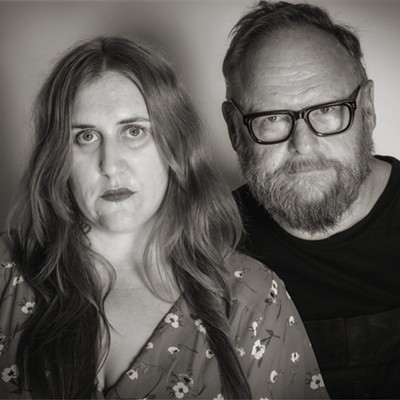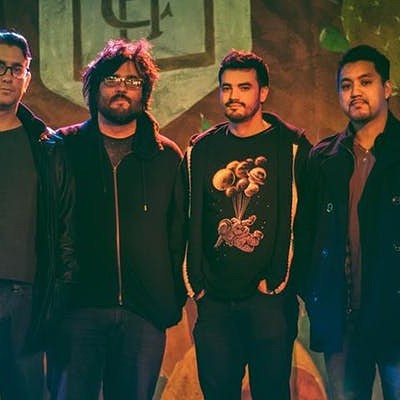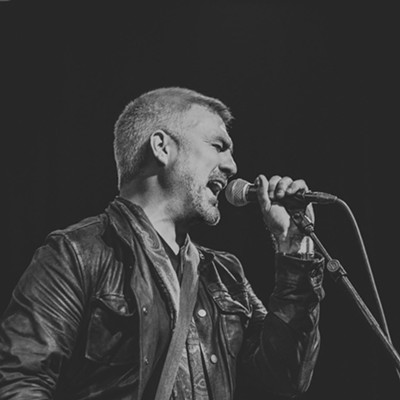Leave it to Florida to impress our town upon the memory of a band that tours so much it hardly knows where to call home.
"We're more informed by sounds coming from everywhere," says Fischer. Currently stationed in New York, Rainer Maria traces its roots to Madison, Wis., where Fischer and bassist/vocalist Caithlin De Marrais met in a poetry class at the University of Wisconsin. Rainer Maria's third full-length, A Better Version of Me, was written in an old Pepperidge Farm dairy barn and recorded at Smart Studios back home in Madison.
The group will be back in Tucson Tuesday, February 20, for a show with Mike Kinsella at Solar Culture.
Geographical influences aside, what really fuels Rainer Maria is poetry. Named after the early 20th-century Austrian poet Rainer Maria Rilke, Rainer Maria is fully aware of the correlation between indie rock and a literary aesthetic. "(The name) has really become a self-fulfilling prophecy," says Fischer. Compare the line "The body has got to be worth saving" from "Ceremony" with a line from "Autumn" by Rilke, translated by Robert Bly: "And yet there is Someone, whose hands / infinitely calm, holding up all this falling." The songs teem with hopeful energy.
Fischer says that right now he feels like Rainer Maria is the "perfect form of a power trio, working on a high level." Everything works in balance: De Marrais' bass lines more than complement the guitar, William Kuehn's drums build on the rhythm and melodies, and the guitars are pulling notes and chords from places unimagined. Rainer Maria's songwriting process brings that about: The musicians start with the guitar, and end with the vocals, letting the melody drive the song. Working as a full-time band, the group has the time to really craft its songs. There were times, Fischer said, when they would write lyrics, sing them with the song several times, decide that the lyrics didn't quite fit, and start all over again.
Subsequently, A Better Version of Me lives up to its title. The album "sounds like you're listening to three people just playing music," says Fischer. Rainer Maria's 1999 release, Look Now Look Again, is full of songs about distance and loss; A Better Version of Me is mostly about fighting to become stronger (emotionally, not physically). "Artificial Light" rings in the album with bouncing guitars, and "Thought I Was" introduces De Marrais' voice, just this side of giving way completely to emotion.
Rainer Maria manages to be smart without sacrificing sound. In "Contents of Lincoln's Pocket," De Marrais' line "How can you deal with that kind of information?" is less of a hopeless rhetorical question and more of a commentary on our culture's interpretation of great figures like Walt Whitman and Abraham Lincoln.
Rainer Maria has a vocabulary and the band members aren't afraid to use it; sometimes the songs are so packed with words it's all De Marrais and Fischer can do to get them out. Every time, it's amazing how they manage to enhance the melody with all those words. Like in the chorus of "Hell and High Water": "And every time I try to get out of her way, the day's full of kids giving you the finger and speeders gonna kill you on your tiny street."
Rainer Maria speaks to that questioning side of life that is constantly wondering which way to turn--to give up or to go on--and the questions the lyrics ask are answered by all the instruments at once, and, as De Marrais says in "Spit and Fire," "Maybe you and I should try all the things we are too scared to try." To quote again more Rilke:
Thus must it be, when willingly you strive
throughout a long and uncomplaining life,
committed to one goal: to give yourself!
And silently to grow and to bear fruit.
"The Apple Orchard"
Rainer Maria the band won't grow silently; it grows in singing guitars and bass lines and drum beats.
Rainer Maria will grace Tucson with its presence this coming Tuesday, February 20 at Solar Culture, 31 E. Toole Ave. They will be accompanied by Mike Kinsella, beginning around 9 p.m. For more information, call 884-0874.









